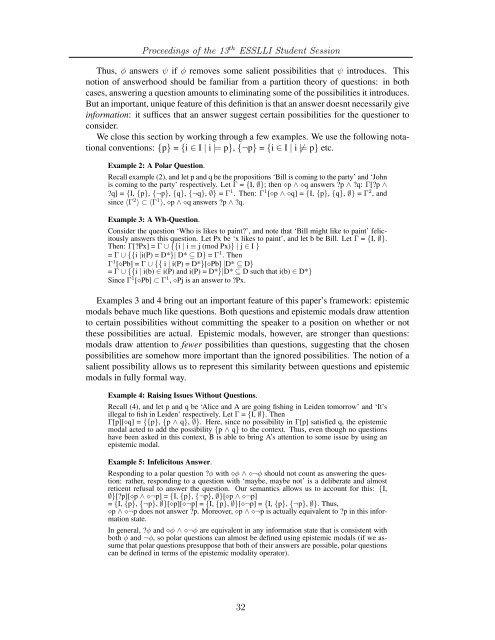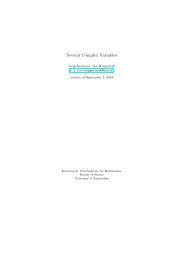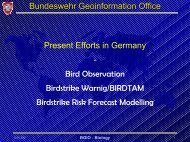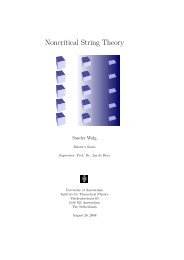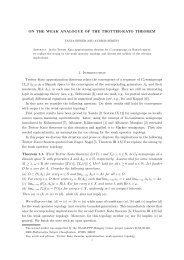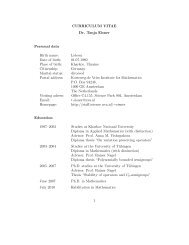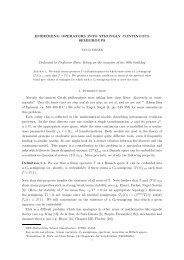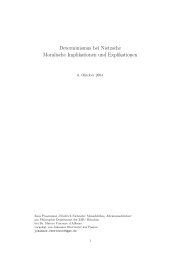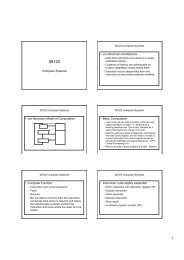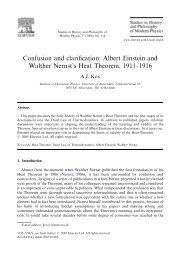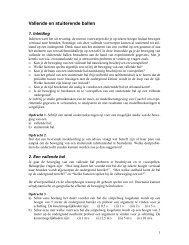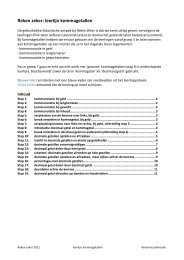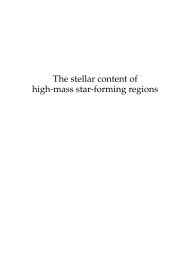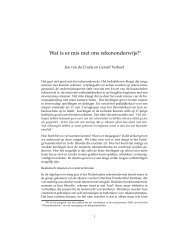Proceedings of the 13 ESSLLI Student Session - Multiple Choices ...
Proceedings of the 13 ESSLLI Student Session - Multiple Choices ...
Proceedings of the 13 ESSLLI Student Session - Multiple Choices ...
You also want an ePaper? Increase the reach of your titles
YUMPU automatically turns print PDFs into web optimized ePapers that Google loves.
<strong>Proceedings</strong> <strong>of</strong> <strong>the</strong> <strong>13</strong> th <strong>ESSLLI</strong> <strong>Student</strong> <strong>Session</strong><br />
Thus, φ answers ψ if φ removes some salient possibilities that ψ introduces. This<br />
notion <strong>of</strong> answerhood should be familiar from a partition <strong>the</strong>ory <strong>of</strong> questions: in both<br />
cases, answering a question amounts to eliminating some <strong>of</strong> <strong>the</strong> possibilities it introduces.<br />
But an important, unique feature <strong>of</strong> this definition is that an answer doesnt necessarily give<br />
information: it suffices that an answer suggest certain possibilities for <strong>the</strong> questioner to<br />
consider.<br />
We close this section by working through a few examples. We use <strong>the</strong> following notational<br />
conventions: {p} = {i ∈ I | i |= p}, {¬p} = {i ∈ I | i �|= p} etc.<br />
Example 2: A Polar Question.<br />
Recall example (2), and let p and q be <strong>the</strong> propositions ‘Bill is coming to <strong>the</strong> party’ and ‘John<br />
is coming to <strong>the</strong> party’ respectively. Let Γ = {I, ∅}; <strong>the</strong>n ⋄p ∧ ⋄q answers ?p ∧ ?q: Γ[?p ∧<br />
?q] = {I, {p}, {¬p}, {q}, {¬q}, ∅} = Γ 1 . Then: Γ 1 [⋄p ∧ ⋄q] = {I, {p}, {q}, ∅} = Γ 2 , and<br />
since 〈Γ 2 〉 ⊂ 〈Γ 1 〉, ⋄p ∧ ⋄q answers ?p ∧ ?q.<br />
Example 3: A Wh-Question.<br />
Consider <strong>the</strong> question ‘Who is likes to paint?’, and note that ‘Bill might like to paint’ felicitously<br />
answers this question. Let Px be ‘x likes to paint’, and let b be Bill. Let Γ = {I, ∅}.<br />
Then: Γ[?Px] = Γ ∪ {{i | i ≡ j (mod Px)} | j ∈ I }<br />
= Γ ∪ {{i |i(P) = D*}| D* ⊆ D} = Γ 1 . Then<br />
Γ 1 [⋄Pb] = Γ ∪ {{ i | i(P) = D*}[⋄Pb] |D* ⊆ D}<br />
= Γ ∪ {{i | i(b) ∈ i(P) and i(P) = D*}|D* ⊆ D such that i(b) ∈ D*}<br />
Since Γ 1 [⋄Pb] ⊂ Γ 1 , ⋄Pj is an answer to ?Px.<br />
Examples 3 and 4 bring out an important feature <strong>of</strong> this paper’s framework: epistemic<br />
modals behave much like questions. Both questions and epistemic modals draw attention<br />
to certain possibilities without committing <strong>the</strong> speaker to a position on whe<strong>the</strong>r or not<br />
<strong>the</strong>se possibilities are actual. Epistemic modals, however, are stronger than questions:<br />
modals draw attention to fewer possibilities than questions, suggesting that <strong>the</strong> chosen<br />
possibilities are somehow more important than <strong>the</strong> ignored possibilities. The notion <strong>of</strong> a<br />
salient possibility allows us to represent this similarity between questions and epistemic<br />
modals in fully formal way.<br />
Example 4: Raising Issues Without Questions.<br />
Recall (4), and let p and q be ‘Alice and A are going fishing in Leiden tomorrow’ and ‘It’s<br />
illegal to fish in Leiden’ respectively. Let Γ = {I, ∅}. Then<br />
Γ[p][⋄q] = {{p}, {p ∧ q}, ∅}. Here, since no possibility in Γ[p] satisfied q, <strong>the</strong> epistemic<br />
modal acted to add <strong>the</strong> possibility {p ∧ q} to <strong>the</strong> context. Thus, even though no questions<br />
have been asked in this context, B is able to bring A’s attention to some issue by using an<br />
epistemic modal.<br />
Example 5: Infelicitous Answer.<br />
Responding to a polar question ?φ with ⋄φ ∧ ⋄¬φ should not count as answering <strong>the</strong> question:<br />
ra<strong>the</strong>r, responding to a question with ‘maybe, maybe not’ is a deliberate and almost<br />
reticent refusal to answer <strong>the</strong> question. Our semantics allows us to account for this: {I,<br />
∅}[?p][⋄p ∧ ⋄¬p] = {I, {p}, {¬p}, ∅}[⋄p ∧ ⋄¬p]<br />
= {I, {p}, {¬p}, ∅}[⋄p][⋄¬p] = {I, {p}, ∅}[⋄¬p] = {I, {p}, {¬p}, ∅}. Thus,<br />
⋄p ∧ ⋄¬p does not answer ?p. Moreover, ⋄p ∧ ⋄¬p is actually equivalent to ?p in this information<br />
state.<br />
In general, ?φ and ⋄φ ∧ ⋄¬φ are equivalent in any information state that is consistent with<br />
both φ and ¬φ, so polar questions can almost be defined using epistemic modals (if we assume<br />
that polar questions presuppose that both <strong>of</strong> <strong>the</strong>ir answers are possible, polar questions<br />
can be defined in terms <strong>of</strong> <strong>the</strong> epistemic modality operator).<br />
32


